Tagore’s visit to Europe and America is one of the stimuli that leads him to write Rakta Karabi and then to translate that into Red Oleanders for pinpointing the crises of western civilisation to the western reading public. Tagore does not accept the values of the industry-based society of the west. Of course, he is not against the machine. He supports the use of the machine in human society up to that extent when it no longer generates greed and lust for power in man’s mind when the machine does not distance man from ‘life and love’. Basudeb examines the translation of Rakta Karabi by the Poet, in the Special Feature, exclusively for Different Truths.
The linguistic framework of Rakta Karabi is Bengali and the cultural significance of Bengali language is associated with the theme as well as the meta-theme of Rakta Karabi. The present article will examine how Tagore matches the foregrounded reality of Rakta Karabi into the linguistic framework of Red Oleanders, which is English. Critics of Tagore’s Rakta Karabi think that this play is a symbolic drama. According to them, Rakta Karabi is a symbolic representation of Tagore’s vehement attack on the mechanical, heartless modern society based on industry and consequent exploitation of the working class people. Accepting this evaluation of Tagore critics of Rakta Karabi as a starting point, let me examine how Tagore transfers this symbolic representation of the subject into Red Oleanders written in a different linguistic framework, the pragmatics of which is of the British culture.
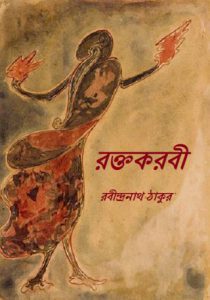 Does Tagore succeed in achieving the same effect of de-familiarisation upon the minds of the English reading public through his own translation of Rakta Karabi into Red Oleanders? Tagore has introduced some songs in Rakta Karabi. Does he accommodate all those Bengali songs in Red Oleanders? If he does not, what are the possible reasons for ignoring some of those Bengali songs in his English translation, Red Oleanders? Often Tagore deletes some dramatic situations of Rakta Karabi while translating it into Red Oleanders. Thus, Tagore exercises freedom in translating Rakta Karabi into Red Oleanders. It will be unwise to think that Tagore does all these changes whimsically. There must be certain strategic principles of translation that Tagore has systematically followed in translating Rakta Karabi into Red Oleanders. In this context let me refer to John Dryden’s formulation of three strategic principles of translation – the application of which will enable us to explore what actually Tagore does in connection with the translation of symbols, images, metaphors, similes, and songs in Red Oleanders:
Does Tagore succeed in achieving the same effect of de-familiarisation upon the minds of the English reading public through his own translation of Rakta Karabi into Red Oleanders? Tagore has introduced some songs in Rakta Karabi. Does he accommodate all those Bengali songs in Red Oleanders? If he does not, what are the possible reasons for ignoring some of those Bengali songs in his English translation, Red Oleanders? Often Tagore deletes some dramatic situations of Rakta Karabi while translating it into Red Oleanders. Thus, Tagore exercises freedom in translating Rakta Karabi into Red Oleanders. It will be unwise to think that Tagore does all these changes whimsically. There must be certain strategic principles of translation that Tagore has systematically followed in translating Rakta Karabi into Red Oleanders. In this context let me refer to John Dryden’s formulation of three strategic principles of translation – the application of which will enable us to explore what actually Tagore does in connection with the translation of symbols, images, metaphors, similes, and songs in Red Oleanders:
- Meta-phrase, or turning an author word by word, and line by line, from one language into another;
- Paraphrase, or translation with latitude, the Ciceronian ‘sense-by sense’ view of translation;
- Imitation, where the translator can abandon the text of the original as he sees fit.
However, Dryden considers the second of these principles as a more balanced path. He presents certain conditions in favour of his choice. The conditions are that a translator must be a poet: he must have equally strong command over both the languages, language of the source language (SL) text and the target language (TL) text. He must be thoroughly familiar with ‘both the characteristics and spirit of the original author besides conforming to the aesthetic canons of his age’. During the seventeen century, Dryden strongly establishes the foundation of English translation theory.
Tagore is very much aware of how to make the best possible use of all these three strategic principles of translation while translating Rakta Karabi into Red Oleanders. A close examination of Red Oleanders and Rakta Karabi will reveal that the dramatist sometimes translates some situations of the SL text word-by-word in Red Oleanders. Where this principle does not fit in, he recollects the sense of the original and then renders that into English for Red Oleanders. However, when both these two principles seem to be inoperative, he resorts to the last principle of abandoning certain dramatic moments for Red Oleanders. Not even a single event of the deletion of a dramatic situation of the original in the TL text affects the communication of what Tagore conveys through his self-translation into Red Oleanders. Naturally, the primary object of a translator is to communicate the meaning and the cardinal 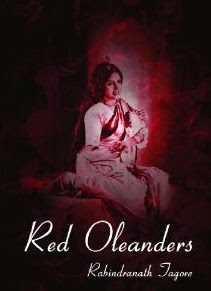 spirit of the SL text to readers of the TL text. Susan Bassnett makes a broad classification of translation typology that becomes popular between the age of industrial capitalism and the First World War.
spirit of the SL text to readers of the TL text. Susan Bassnett makes a broad classification of translation typology that becomes popular between the age of industrial capitalism and the First World War.
They are: “Translation as a scholar’s activity, where the pre-eminence of the SL text is assumed de facto over any TL version. Translation as a means of encouraging the intelligent reader to return to the SL original. Translation as a means of helping the TL reader becomes the equal of what Schleiermacher called the better reader of the original, through a deliberately contrived foreignness in the TL text. Translation as a means whereby the individual translator who sees himself as Aladdin in the enchanted vaults (Rossetti’s imaginative image) offers his own pragmatic choice to the TL reader. Translation as a means through which the translator seeks to upgrade the status of the SL text because it is perceived as being on a lower cultural level”.
An examination of all these categories of translation shows that the first and the second categories are literal and pedantic translations meant for learned minority readers. The third one aims at translations characterised by ‘archaisms of form and language’. The fourth and the fifth types encourage freer translation that tends to contest the SL text by the translator who is in the assorted process of looking at the original. All these categories are relevant to the study of Tagore’s Red Oleanders. For the sake of effective communication, Tagore occasionally resorts to the literal translation of Rakta Karabi. Sometimes, he comes out as a translator who is very much meticulous about the details of certain nuances of symbols he transfers from Rakta Karabi to Red Oleanders. The fact is that one needs to be in possession of minimum erudition to understand meanings and allusions of certain words in Tagore’s writings even in Bengali. Tagore emerges also as a champion of free translation. Certain dramatic moments in Red Oleanders are the examples of the translator’s bold and effective attempt at doing a free translation. Tagore moves away from the original in many dramatic situations of Red Oleanders.
What Matthew Arnold emphasises here is that a translator should be very much careful about the SL text. He should be ‘faithful’ to the original. He should be committed to the SL text. TL readers should not feel any sense of loss at the time of reading the translated version for their inability to read the original. While translating Rakta Karabi into English, Tagore tries his utmost to ‘focus on the SL text primarily’.
Before a study of Red Oleanders as a literary text is undertaken a few words regarding why Tagore writes Rakta Karabi and then translates it into English Red Oleanders for the western reading public are relevant to the present context. Tagore starts touring European countries and the U.S.A. in the early twenties of the last century. During this visit, he experiences the material prosperity of the people of the west. He notices how the science and technology brings about the improvement in the quality of material living in the west. He observes that the materialistic philosophy of life presides over every action of an individual in the west. The consequence of man’s total dependence on science and a materialistic philosophy of life make the western life mechanical. Machine dependence of the west, Tagore notices during this visit, propels the western life and society. Like Tagore, the machine dependence of the western society and its devastating impact upon the life of an individual is also the experience of an English poet Wystan Hugh Auden, contemporary to Tagore, who has a poem, The Unknown Citizen. (To JS/07/M/378. This Marble Monument is Erected by the State) the man is known by the number only.
A note of sadness pervades the whole poem. Auden subtly reveals his suffering through this poem by implicating the modern civilisation, a villain, who makes an individual a machine. The man has no identity of his own. He is known by the number the state has allotted to him. Tagore on many occasions has expressed his reservation on the limitations of the machine-based society of the west. He writes letters to C.F. Andrews, while he is on his visit to America. The background of some of those letters is obviously the poet’s intention to expose ‘the Visva Bharati ideal’ to the people of the west. But in no ambiguous term has Tagore expressed his revulsion for the heartless machine-based society of the west and its materialistic philosophy of life. He writes a letter to C.F. Andrews, from New York, on 13 December 1920, an excerpt: “Our Seventh Paus Festival at the Asram is near at hand. I cannot tell you how my heart is thirsting to join you in your festival. I am trying to console myself with the thought that something very big and great is going to be the outcome of the effort I am making. But deep in my heart, I know that simplicity of life and endeavour makes for real happiness…. In this country, I live in the dungeon of the Castle of Bigness. My heart is starved. Day and night I dream of Santiniketan, which blossoms like a flower in the atmosphere of the unbounded freedom of simplicity.… Here I feel every day what a terrible nightmare it is for the human soul to bear this burden of the monster Arithmetic.… I long to leave all this, totally reject this unreality, take the next steamer I can get, and run back to Santiniketan and serve it with my life and love.”
Tagore is disgusted with life in the West. He feels the absence of ‘life and love’ in the West. To him, the west is “the dungeon of the Castle of Bigness”. The impetus Tagore perhaps receives for writing Rakta Karabi and then translating that into English Red Oleanders is his apathy towards the industry based  society that makes an individual a machine. In another letter addressed to C.F Andrews on 5 February 1921, Tagore writes: “Yesterday some Santiniketan photographs came by chance into my hands. I felt as if I was suddenly wakened up from a Brobdingnagian nightmare. I say to myself. This is our Santiniketan. It is ours, because it is not manufactured by a machine.… What makes me feel so sad, in this country, is the fact that people here do not know that they are not happy. They are proud, like the sandy desert, which is proud of its glitter.”
society that makes an individual a machine. In another letter addressed to C.F Andrews on 5 February 1921, Tagore writes: “Yesterday some Santiniketan photographs came by chance into my hands. I felt as if I was suddenly wakened up from a Brobdingnagian nightmare. I say to myself. This is our Santiniketan. It is ours, because it is not manufactured by a machine.… What makes me feel so sad, in this country, is the fact that people here do not know that they are not happy. They are proud, like the sandy desert, which is proud of its glitter.”
The image of Santiniketan is a contrast to what he sees in the west. If Nandini is Tagore’s Santiniketan, the King’s Yaksha Town is the west. His visit to Europe and America is one of the stimuli that leads him to write Rakta Karabi and then to translate that into Red Oleanders for pinpointing the crises of western civilisation to the western reading public. Tagore does not accept the values of the industry-based society of the west. Of course, he is not against the machine. He supports the use of a machine in human society up to that extent when it no longer generates greed and lust for power in man’s mind when the machine does not distance man from ‘life and love’.
The Yaksha Town in Red Oleanders makes everyone a machine. Nandini and Ranjan are the antitheses of the King in Red Oleanders. In “Can Science be humanised?”
Tagore defines what modern scientific progress means thus, “What is called progress is the progress in the mechanical contrivances; it is, in fact, an indefinite extension of our physical limbs and organs which, owing to the enormous material advantage that it brings to us has tempted the modern man away from his inner realm of spiritual value and thus the balance is lost. … But today our homes have dissolved into hotels, community life is stifled in the dense and dusty atmosphere of the office, man and woman are afraid of love, people clamour for their rights and forget their obligations and they value comfort more than happiness and spirit of display more than that of beauty”.
Tagore is against this mechanical and heartless growth of the modern western civilisation. Even almost after a decade from the publication of Red Oleanders, Tagore expresses his opinion about ‘the modern pursuit of Science’ in a letter, addressed to Gilbert Murray on 16 September 1934. An excerpt of that letter is relevant in this context: “My occasional misgivings about the modern pursuit of Science are directed not against Science, for Science itself can be neither good nor evil, but its wrong use. If I may just touch here on your reference to machines, I would say that machines should not be allowed to mechanize human life but contribute to its wellbeing, which as you rightly point out, it is constantly doing when it is man’s sanity which controls the use of machinery”.
Tagore believes that machine should not ‘mechanise human life’. In Red Oleanders, miners of Yaksha Town are known by the numbers allotted to them by the King’s administration. Perhaps those miners have forgotten their own names. They have no identity of their own except their number. In Auden’s poem, the ‘Unknown Citizen’ is a gentleman because he pays taxes to the government regularly; he works in a factory and he never gets fired; he buys the newspaper every day; he joins the trade union’s activities; he responds to the laws of the land when he is addressed by his number. He has almost forgotten his own name. The unknown citizen is loyal to the State. The question whether he is happy or not is absolutely meaningless. Even after his death, the State erects a marble monument that identifies him by the State-given number allotted to him instead of his name. Miners in Red Oleanders have also lost their identity. They are also known by the numbers the Kings administration allotted to them. However, they are not happy; they revolt against the King and his administrative network under the influence of Nandini. Nandini brings them back to life and love. Herein lies the difference between the miners of Red Oleanders and the ‘Unknown Citizen’ of Auden’s poem.
The overwhelming and blind acceptance of the materialistic philosophy of life, which depends exclusively upon reason, is Tagore’s another point of criticism during his visit to Europe and America in the twenties of the last century. The importance of reason in life is undeniable. Science plays an important role in life. But the reason is not all in life. In an article, “The Modern Age”, Tagore unequivocally says that the modern education creates a particular mindset that tends to ignore “the spiritual apprehension of truth – the truth of a person as the ultimate reality of existence”. Science does not inspire a man to see the truth in this perspective. Science depends exclusively on reason. In the same article Tagore says: “Wherever man meets a man in a living relationship, the meeting finds its natural expression in works of art, the signatures of beauty, in which the mingling of the personal touch leaves its memorial.… Science has its proper sphere in analysing this world as a construction, just as grammar has its legitimate office in analysing the syntax of a poem. But the world, as a creation, is not a mere construction; it too is more than syntax. It is a poem, which we are apt to forget when grammar takes exclusive hold of our minds”.
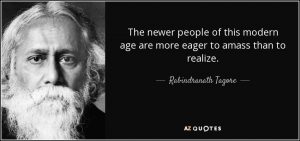
Tagore does not undermine the importance of science when it analyses the world as a construction; he does not ignore the importance of grammar of the syntax of a poem, but at the same time, he underlines that the world is also a creation, a poem by its total identity. The Professor in Red Oleanders is in an intellectual predicament when he sees Nandini. He cannot understand his inexplicable attraction for Nandini. He is a scholar. He has seen and analysed every phenomenon of the world with his reason and intellect. He is an outright materialist but the moment he is in association with Nandini, he wavers in his mind and confesses: “The privilege of wasting time proves one’s wealth of time. We poor drudgers are insects in a hole in this solid toil, you are the evening star in the rich sky of leisure. When we see you, our wings grow restless. Come to my room. For a moment, allow me to be reckless in my waste of time.”
The Professor in Red Oleander knows well that he simply wastes his time by inviting Nandini to his room. He confesses that his ‘wings grow restless’ when he sees her. With his reason, he is incapable of understanding his invincible attraction for Nandini. He does not understand the significance of Nandini’s chain of red oleanders. The play first introduces Nandini and Kishor and the conversation between them is significant because it makes readers understand the main conflict of the drama. Readers can get clues as to what goes to happen next.
Nowhere in the play does Ranjan appear physically but his presence is felt from the beginning to the end. When any character in the play speaks, Ranjan remains in the background. Ranjan is young and handsome. He is a symbol of life and liberty. He sings the song of indolence. He is also a digger. He is sent to the tunnel of Vajragarh. But the Headman of Vajragarh reports that Ranjan evades his assigned work. He is disobedient and he does not care for anybody. He wants to be a free man. Nandini is inspired by his principle of liberty. She wants him to come to Yaksha Town. Under the influence of Nandini, the labourers of Yaksha Town are united. She transports the breeze of liberty and living in the weird world the King has created in his town for extracting the wealth from the bottom of the earth. Being inspired by the ideals of Ranjan, she awakens the desire in most of the labourers to go out of the maw of Yaksha Town. Kishor starts dreaming even to sacrifice his life for the sake of the call of Nandini. Bishu is one of the tunnel diggers in Yaksha Town. He also tastes the freedom of life
Nandini’s influence upon everybody is overwhelming. The Professor wants to come out from the cobweb of his scholarship. When the Professor sees her, his erudition is worn out by the sudden gust of her passing by. Ranjan, Nandini, Kishor, Bishu, Gokul, Professor, and others constitute one group. These characters are not the characters of flesh and blood. They are born free. They champion man’s freedom. They are indeed one concept.
When Tagore visits Moscow in 1930, he meets several important persons there. In a conversation with Professor F.N. Petroff, Tagore says: “I thank you for your cordial welcome. I know you are making a tremendous experiment in this country. I am not in a position to give any considered opinion about it, but I cannot help expressing my admiration for your courage, for your keen enthusiasm to build up your 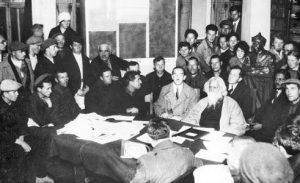 social structure on the equitable basis of human freedom. It is wonderful to feel that you are interested not merely in your national problems but in the good of humanity as a whole.”
social structure on the equitable basis of human freedom. It is wonderful to feel that you are interested not merely in your national problems but in the good of humanity as a whole.”
The point I am trying to make is that it would be naïve to think that Tagore is unfamiliar with the Communist Manifesto and is indifferent to the newly emerging society in the Soviet Union while he visits the European Continent and America. Tagore’s presentation of the character like Gosain in Red Oleanders shows how a priest helps rulers of the industrially developed countries in the West mechanise and exploit the common people for their class interest. Tagore’ Red Oleanders may be considered a thesis drama. In this connection, Tagore’s explanation of the intention of this play is relevant. In a letter written in 1924, he wrote: The people of the country of Kuvera are engaged in digging out with all their might precious gold, tearing it out from the underground world. Driven by the covetous urge for cruel hoarding the people have banished all the sweetness of life from the place. There Man, ensnaring himself within his own complexities, has severed himself from the rest of the universe. That is why he has forgotten that the value of joy is greater than the value of gold; he has forgotten that there is no fulfillment in might, that there is fulfillment only in love.… Into this state of affairs the woman enters: the surge of life begins to exert its influence on the forces of the machine.… It is then that man in the inspiration received from the deep incentive force of woman engages himself in freeing the flow of life from its shackles, breaking away from the prison cell of his own creation…
The King has a diabolically efficient network of administration with the Governor who enjoys absolute powers. There is a hierarchal order of administrative personnel in his administration. The King and his men stand for the force that enslaves every one of Yaksha Town for extracting treasures from the mine. He stands for a system of repression, which ‘he himself has erected’. Nandini and Ranjan stand for freedom and the life in conjunction with nature. The conflict between these two forces ends in the defeat of the King and his force. The play begins with the song of life sung by Kishor when he collects some red oleanders to offer to Nandini, and it naturally ends with the song of autumn. This is not ‘a fog of romanticism’; on the contrary, this is a spontaneous celebration of the community of the suffering people. The play thus registers appropriately the victory of man over machine, singing the joy of life and nature.
©Basudeb Chakraborti
Photos from the Internet
#TranslationsOfRabindranthTagore #RabindranathTagore #TributeToTagore #TechniquesOfTranslations #RaktaKarabi #TranslationOfRaktaKarabi #RedOleandera #SpecialFeature #DifferentTruths

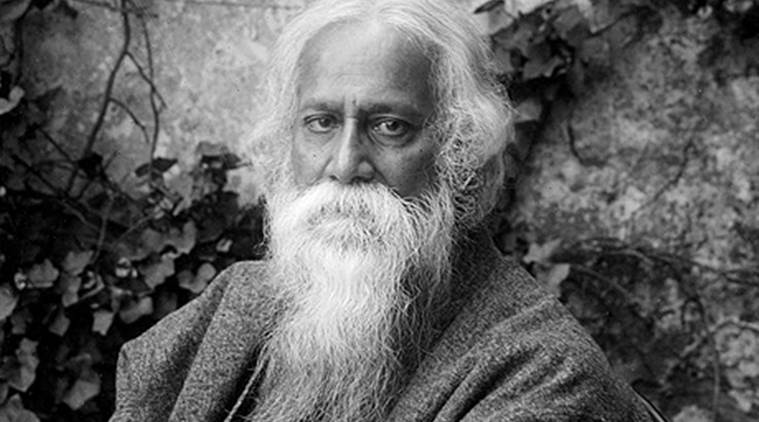
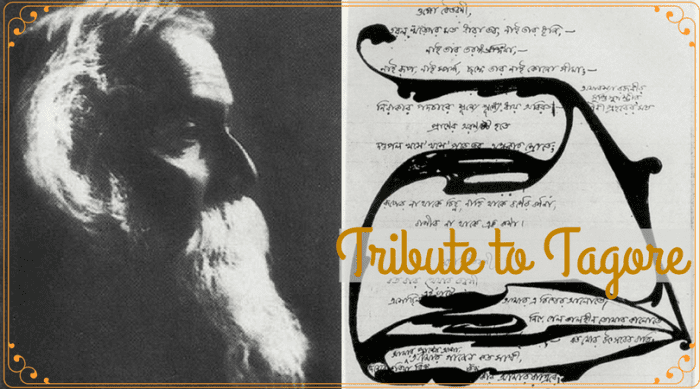
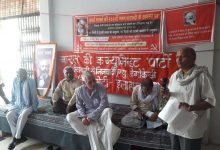
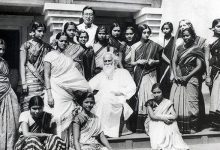

 By
By

 By
By
 By
By